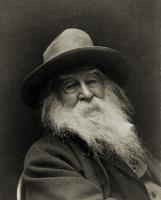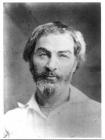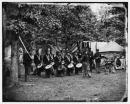Come up from the fields father, here’s a letter from our Pete,
And come to the front door mother, here’s a letter from thy dear son.
Lo, ’tis autumn,
Lo, where the trees, deeper green, yellower and redder,
Cool and sweeten Ohio’s villages with leaves fluttering in the moderate wind,
Where apples ripe in the orchards hang and grapes on the trellis’d vines,
(Smell you the smell of the grapes on the vines?
Smell you the buckwheat where the bees were lately buzzing?)
Above all, lo, the sky so calm, so transparent after the rain, and with wondrous clouds,
Below too, all calm, all vital and beautiful, and the farm prospers well.
Down in the fields all prospers well,
But now from the fields come father, come at the daughter’s call,
And come to the entry mother, to the front door come right away.
Fast as she can she hurries, something ominous, her steps trembling,
She does not tarry to smooth her hair nor adjust her cap.
Open the envelope quickly,
O this is not our son’s writing, yet his name is sign’d,
O a strange hand writes for our dear son, O stricken mother’s soul!
All swims before her eyes, flashes with black, she catches the main words only,
Sentences broken, gunshot wound in the breast, cavalry skirmish, taken to hospital,
At present low, but will soon be better.
Ah now the single figure to me,
Amid all teeming and wealthy Ohio with all its cities and farms,
Sickly white in the face and dull in the head, very faint,
By the jamb of a door leans.
Grieve not so, dear mother, (the just-grown daughter speaks through her sobs,
The little sisters huddle around speechless and dismay’d,)
See, dearest mother, the letter says Pete will soon be better.
Alas poor boy, he will never be better, (nor may-be needs to be better, that brave and simple soul,)
While they stand at home at the door he is dead already,
The only son is dead.
But the mother needs to be better,
She with thin form presently drest in black,
By day her meals untouch’d, then at night fitfully sleeping, often waking,
In the midnight waking, weeping, longing with one deep longing,
O that she might withdraw unnoticed, silent from life escape and withdraw,
To follow, to seek, to be with her dear dead son.
And come to the front door mother, here’s a letter from thy dear son.
Lo, ’tis autumn,
Lo, where the trees, deeper green, yellower and redder,
Cool and sweeten Ohio’s villages with leaves fluttering in the moderate wind,
Where apples ripe in the orchards hang and grapes on the trellis’d vines,
(Smell you the smell of the grapes on the vines?
Smell you the buckwheat where the bees were lately buzzing?)
Above all, lo, the sky so calm, so transparent after the rain, and with wondrous clouds,
Below too, all calm, all vital and beautiful, and the farm prospers well.
Down in the fields all prospers well,
But now from the fields come father, come at the daughter’s call,
And come to the entry mother, to the front door come right away.
Fast as she can she hurries, something ominous, her steps trembling,
She does not tarry to smooth her hair nor adjust her cap.
Open the envelope quickly,
O this is not our son’s writing, yet his name is sign’d,
O a strange hand writes for our dear son, O stricken mother’s soul!
All swims before her eyes, flashes with black, she catches the main words only,
Sentences broken, gunshot wound in the breast, cavalry skirmish, taken to hospital,
At present low, but will soon be better.
Ah now the single figure to me,
Amid all teeming and wealthy Ohio with all its cities and farms,
Sickly white in the face and dull in the head, very faint,
By the jamb of a door leans.
Grieve not so, dear mother, (the just-grown daughter speaks through her sobs,
The little sisters huddle around speechless and dismay’d,)
See, dearest mother, the letter says Pete will soon be better.
Alas poor boy, he will never be better, (nor may-be needs to be better, that brave and simple soul,)
While they stand at home at the door he is dead already,
The only son is dead.
But the mother needs to be better,
She with thin form presently drest in black,
By day her meals untouch’d, then at night fitfully sleeping, often waking,
In the midnight waking, weeping, longing with one deep longing,
O that she might withdraw unnoticed, silent from life escape and withdraw,
To follow, to seek, to be with her dear dead son.
Contributed by Dead End - 2012/11/13 - 14:35
Language: Italian
Versione italiana di Eleonora
Torna dai campi, padre, c'è una lettera dal nostro Pete
E vieni alla porta, madre: è arrivata una lettera da parte del tuo caro ragazzo
Ecco, è Autunno
Là, dove gli alberi, di un verde più cupo, poi d'oro e scarlatti,
Rinfrescano e accarezzano i villaggi dell'Ohio con le loro foglie, danzanti nella brezza leggera;
dove le mele pendono mature nei frutteti, l'uva sulle viti intrecciate.
(Senti il profumo dell'uva sulle viti?
E senti l'odore del grano dove le api tardive ronzavano?)
E sopra tutto, lassù, il cielo così calmo, così trasparente dopo la pioggia - le sue nubi splendide.
E sulla terra anche, tutto è quiete, vitalità e bellezza: le fattorie prosperano.
Giù nei campi tutto è rigoglioso,
ma ora torna dai campi, padre: c'è tua figlia che ti chiama
E vieni subito all'ingresso, madre, vieni sulla porta.
S'affretta al meglio che può- c'è qualcosa di strano- le tremano le gambe
Non s'attarda a ravvivarsi i capelli nè a sistemarsi il cappellino
"Apri la busta, svelta!"
"Oh, ma Pete non scrive in questo modo, ed eppure qui c'è il suo nome"
"La mano d'un altro scrive per il nostro bambino, povero cuore mio!"
E un'intera vita le passa davanti agli occhi - e sprazzi di buio ad intermittenza- così da poter leggere solo le parole più importanti,
Frasi spezzate - "una ferita d'arma da fuoco sul torace; una schermaglia di soldati a cavallo; trasferito all'ospedale da campo;
Attualmente debole, ma vicino alla ripresa"
Ah, di tutto il prospero Ohio con le sue città e le sue fattorie,
adesso per me esiste quella sola figura
Con il viso pallido e malato e la testa disorientata, stanca,
Che si appoggia allo stipite di una porta
"Non addoloratevi, cara madre", (dice la figliola adolescente tra i singhiozzi,
mentre le sue sorelline le si stringono intorno mute e sgomente)
"Vedete, cara madre, la lettera dice che Pete presto starà meglio"
Oh no, povero ragazzo, non si riprenderà mai, (non ha nemmeno bisogno di guarire, quel povero figliuolo coraggioso)
E mentre la famiglia è lì in casa, sulla porta, Pete se ne è già andato,
è morto il loro unico figlio maschio.
Ma la madre ha bisogno di riprendersi,
Il suo corpo smagrito veste di nero,
Non tocca cibo, la sera non prende sonno, passeggia spesso,
si sveglia in piena notte, piange, desidera dal profondo del cuore,
di potersi solo ritirare senza essere vista, fuggire dalla vita in silenzio e scappare,
Per seguire, per cercare, per stare insieme al suo bambino morto.
E vieni alla porta, madre: è arrivata una lettera da parte del tuo caro ragazzo
Ecco, è Autunno
Là, dove gli alberi, di un verde più cupo, poi d'oro e scarlatti,
Rinfrescano e accarezzano i villaggi dell'Ohio con le loro foglie, danzanti nella brezza leggera;
dove le mele pendono mature nei frutteti, l'uva sulle viti intrecciate.
(Senti il profumo dell'uva sulle viti?
E senti l'odore del grano dove le api tardive ronzavano?)
E sopra tutto, lassù, il cielo così calmo, così trasparente dopo la pioggia - le sue nubi splendide.
E sulla terra anche, tutto è quiete, vitalità e bellezza: le fattorie prosperano.
Giù nei campi tutto è rigoglioso,
ma ora torna dai campi, padre: c'è tua figlia che ti chiama
E vieni subito all'ingresso, madre, vieni sulla porta.
S'affretta al meglio che può- c'è qualcosa di strano- le tremano le gambe
Non s'attarda a ravvivarsi i capelli nè a sistemarsi il cappellino
"Apri la busta, svelta!"
"Oh, ma Pete non scrive in questo modo, ed eppure qui c'è il suo nome"
"La mano d'un altro scrive per il nostro bambino, povero cuore mio!"
E un'intera vita le passa davanti agli occhi - e sprazzi di buio ad intermittenza- così da poter leggere solo le parole più importanti,
Frasi spezzate - "una ferita d'arma da fuoco sul torace; una schermaglia di soldati a cavallo; trasferito all'ospedale da campo;
Attualmente debole, ma vicino alla ripresa"
Ah, di tutto il prospero Ohio con le sue città e le sue fattorie,
adesso per me esiste quella sola figura
Con il viso pallido e malato e la testa disorientata, stanca,
Che si appoggia allo stipite di una porta
"Non addoloratevi, cara madre", (dice la figliola adolescente tra i singhiozzi,
mentre le sue sorelline le si stringono intorno mute e sgomente)
"Vedete, cara madre, la lettera dice che Pete presto starà meglio"
Oh no, povero ragazzo, non si riprenderà mai, (non ha nemmeno bisogno di guarire, quel povero figliuolo coraggioso)
E mentre la famiglia è lì in casa, sulla porta, Pete se ne è già andato,
è morto il loro unico figlio maschio.
Ma la madre ha bisogno di riprendersi,
Il suo corpo smagrito veste di nero,
Non tocca cibo, la sera non prende sonno, passeggia spesso,
si sveglia in piena notte, piange, desidera dal profondo del cuore,
di potersi solo ritirare senza essere vista, fuggire dalla vita in silenzio e scappare,
Per seguire, per cercare, per stare insieme al suo bambino morto.
Contributed by Eleonora - 2013/9/27 - 23:39
×
![]()
Note for non-Italian users: Sorry, though the interface of this website is translated into English, most commentaries and biographies are in Italian and/or in other languages like French, German, Spanish, Russian etc.








Versi di Walt Whitman, dalla raccolta “Drum Taps” pubblicata nel 1865
Musica di Kurt Weill, da “Four Walt Whitman Songs” del 1947
Testo trovato su The Lied, Art Song and Choral Texts Archive
A partire dalla battaglia di Fredericksburg, in cui suo fratello era rimasto ferito, Walt Withman prestò opera di soccorso come infermiere volontario negli ospedali da campo dell’Unione e lì descrisse la carneficina, la sofferenza, la morte con grande compassione per tutti coloro che vi erano coinvolti e travolti, convinto – era sì un patriota ma di fede quacchera, una religione che ripudiava la violenza – che “la guerra non può essere per noi [americani] ciò che è stata per tutte le nazioni di ogni epoca fino ad oggi; non può la guerra condizionare e tirannizzare ogni aspetto della vita delle nazioni e degli individui; deve trattarsi solo di un episodio, un contrattempo momentaneo.” (fonte: en.wikipedia)
E’ evidente che il grande poeta si illudeva e si sbagliava…
Ma in questa poesia Whitman descrive ciò che lui stesso doveva aver provato quando ricevette notizia del ferimento del fratello George al fronte, aggiungendo che il dolore di una madre per la perdita di un figlio in guerra – e in quel sanguinosissimo conflitto fratricida nel corso del quale oltre 600.000 furono i morti quante madri piansero i loro figli!– deve essere ancora più inconsolabile, a tal punto da sfiorare il desiderio di ricongiungersi ad egli nella morte.